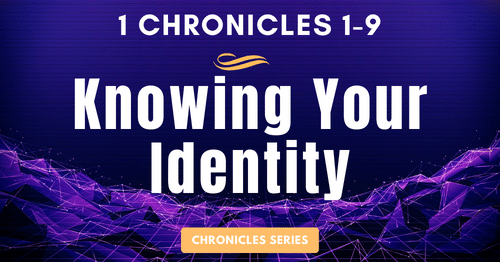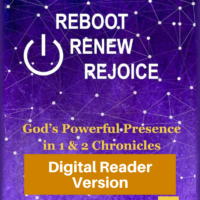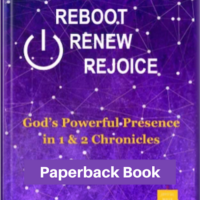1 Chronicles 1-9 • Knowing Your Identity

AI was not used to generate this post.
Who are you? What is your purpose? Are those two questions related? In the books of Chronicles, we see that the answer is “yes” to that last question. In the last article, we looked at an overview of the history of Israel and the value of a much-needed reboot in their lives as well as in ours. This is post #2 in the Chronicles blog series. In this article, we will look at why knowing who you are—your identity—is so important to your faith and to understanding your purpose on this earth.
Key Takeaways
- The books of Chronicles emphasize the importance of knowing your identity in relation to faith and purpose.
- Chronicles reveals how the Jewish people returned to their roots, reconnecting with their heritage after the exile.
- Feeling connected to family history can strengthen personal identity, just as understanding one’s spiritual lineage does.
- Every believer gains a new identity in Christ that transforms their life and sets them free from past sins.
- Recognizing who you are in Christ empowers you to live out your faith joyfully and meaningfully.
Listen to this post as a similar podcast from our Reboot Renew Rejoice Bible Study covering the books of 1 and 2 Chronicles in the Old Testament. (11 lessons)
An Unbroken Connection
The author of the books of Chronicles showed a despairing people that they had a powerful, faithful God who would strengthen them to reboot their lives so that they could walk faithfully with Him. In Chronicles, we see the unstoppable power of God’s presence with His people, the same power of God’s presence that every Christian has today. As you read 1 and 2 Chronicles, you can find out how our God’s powerful presence helps us to reboot our lives, renew our commitment to Him, and live a life of rejoicing as a result.
The Chronicler meticulously researched and included the lineages of the twelve tribes of Israel so that those who were returning to their homeland after the Babylonian exile would know where to go and find their land). David’s descendants are listed several times to make sure everyone knew who was eligible to be king or priest again. The Jewish people trying to resettle their land and reboot their lives needed to know their identity. Who were they? Why were they a people? What was their purpose? They found the answers in Chronicles as they discovered their rich heritage and their unbroken connection with their God-ordained beginnings as a people. You will see that, too.
The prophet Isaiah spoke to the people of Israel who wanted to live righteously in the middle of a wicked culture of Jews by birth but who no longer looked or acted like God’s people. This is what he said,
Look to the rock from which you were cut and to the quarry from which you were hewn. (Isaiah 51:1)
Then, Isaiah referenced Abraham and Sarah who were the physical and spiritual progenitors of the Jewish people. Basically, Isaiah was telling them to remember their origin and their purpose. It all began with Abraham and Sarah who trusted God enough to leave everything behind and follow Him only. All those who have descended from Abraham and Sarah as well as those who have chosen to trust God like they did. All of us need to feel connected to our story.
Feeling Connected
I read an article that referenced the importance of feeling connected.
Feeling like you belong to a story that began before you—and unfolds with you—helps to shape your perspective and purpose. In fact, this is the appeal of businesses that sell genealogical information. They market testimonies of excited clients claiming “Now I know who I am!” It is the power of feeling connected. (Randy Guliuzza, Acts & Facts, December 2019, p. 17)
The power of feeling connected has greatly influenced my life. Years ago, I inherited from my aunt a wedding band with three diamonds mounted on top. I was told it was my grandmother’s wedding ring. The diamonds definitely are from her engagement ring. But when I examined the inside of the band, the engraved initials do not belong to my grandfather! Aha! There is a story here.
After some research, it turns out that the wedding band itself belonged to my great-grandmother Anna. I have a picture of her and a little bit of her story. And suddenly I feel connected to her when I wear her ring, this woman who was dead long before I was born, even before my dad was born. She is not a name on a page or just a subject in a photograph any longer. Anna was a woman who really lived as part of my family history.
When we believe in the Lord Jesus as Savior, we become members of a new family with a rich history of its own. Even apart from our national or family history, the Bible tells us who we are in Christ. Our Christian genealogical record begins in true royalty—the Lord Jesus. And He descended from a long line of Jewish kings whose ancestor was David. That ancestry is recorded in the books of Chronicles.
The first nine chapters of 1 Chronicles is the Old Testament “Ancestry.com”. The Jewish people who were trying to resettle their land and reboot their lives needed to know their identity. Who were they? Why were they a people? What was their purpose?
Remember what Isaiah told them.
Look to the rock from which you were cut and to the quarry from which you were hewn. (Isaiah 51:1)
They found the answers in Chronicles as they discovered their rich heritage and their unbroken connection with their God-ordained beginnings as a people. They could read the biographies of their ancestors and feel connected to them. Even more importantly, they needed to know who their God was and why they should only serve Him. They needed to see that He was a faithful God, and they could trust Him. They needed to be reminded of the power of His presence with them. Our God is the same God so we can learn about Him as well.
Being a Memorable Woman
After spending a semester studying Psalms in a local women’s Bible study, I thought I would delve more into the time period during which nearly all of the psalms were written. That would include the time of Israel as a kingdom under David and his successors. So, I started reading 1 Chronicles and immediately saw that the first nine chapters were mostly names. Millions of names. I decided I would mark every woman mentioned and any significant details about them. You know what I found out?
In the first 9 chapters of 1 Chronicles, there are 53 references to women listed by name. These Old Testament women were distinctive mothers, sisters, wives, and daughters.
In an agrarian society, and in genealogies spreading through several hundred years, to be mentioned specifically in the historical record meant you were someone or did something that was memorable. How many of us will be memorable after 400 years?
Isaiah 32:8 says this,
The noble make noble plans, and by noble deeds they stand. (Isaiah 32:8)
That is true about many women in the Bible, including in the books of Chronicles.
One woman in 1 Chronicles named Sheerah has quite a tribute written about her. Her ancestor was Joseph’s son Ephraim who headed one of the 12 tribes of Israel. This is what we read in 1 Chronicles chapter 7,
His daughter was Sheerah, who built Lower and Upper Beth Horon as well as Uzzen Sheerah. (1 Chronicles 7:24)
That just leaped off the page at me. Why have I never heard about Sheerah before?
The two Beth-horons were Canaanite towns that the Israelites captured in the conquest of that area described in Joshua 10. They became part of Ephraim’s territory (Joshua 16:3-5). The term “built” (used in 1 Chronicles 7:24) may mean not only to build but also to rebuild or fortify. Two of the three cities, Lower Beth-Horon and Upper Beth-Horon were on a hillside, one high above the other.
Somehow Sheerah is credited with rebuilding three towns on the edge of Ephraim’s allotted territory in Israel after it was conquered. Perhaps she received the land as an inheritance (like Caleb’s daughter Acsah did in Judges 1:12-15) and enlarged it for family reasons. Whether it was by her own design or by her instigation and influence on others who did the building, Sheerah made an impact on her time and her community that was remembered hundreds of years later. All of us can do that in some small way whether by work we do or by influence that we have.
The Holy Spirit made sure her name was in there. That made me smile. She was a memorable woman.
As you read the Chronicles, you will run across some other memorable women. Some are memorable for great reasons, like Sheerah—Sarah, Ruth, the Shunammite woman, and Esther. Others are remembered for not-so-good reasons, like Jezebel, Athaliah, and the rebellious women of Jeremiah 44:15-29. They were real people just like we are.
Those who were rebooting Israel needed to know their heritage. And memorable women who knew the power of God’s presence in their lives and knew their identity as a worshiper of the Holy One of Israel were part of that heritage. That reminded me of the women that are covered in the Everyday Women, Ever-Faithful God Bible Study. Every woman needs to know who they are.
Isaiah’s words apply to us today as well.
Look to the rock from which you were cut and to the quarry from which you were hewn. (Isaiah 51:1)
Knowing Who You Are
Knowing your physical identity
In our world, identity drives everything about life. You likely carry some kind of identity card (ID) with you—a driver’s license or a work-related card. What is on it? Usually, it is your name and picture, some identifying characteristics like address or job title, and the authority that issued the ID to you. Often, your signature is on the card representing your choice to enter into contract with the issuing authority. If someone asked, “Who are you?” you could answer with the information on that card.
Identities tell us who we are, where we live, and where we can travel. Our identity drives what we can buy with our finances and qualifies us for employment. That is why we are so devastated when it is stolen!
Knowing your spiritual identity is even more important
Have you trusted in Jesus Christ for your salvation? If so, you received a new spiritual identity from that very moment you said yes to believing in Jesus. But do not expect the culture to validate your new identity. From a worldly point of view, you and I are the same as we have always been. All our “baggage” is still seen hanging around our necks or dragged behind us.
Dear Christian, cling to this truth: Every Christian is a new creation with a new identity in Christ. This new identity declares how God, who is our authority, now views you and me! It is what He has done for us and to us that really counts, not what the culture thinks of us or what we think of ourselves. And there are wonderful benefits that go along with this new position in life—redemption, reconciliation, forgiveness, regeneration, justification, propitiation, and sanctification just to name a few!
Your faith in Jesus Christ sets you free from your previous sin-stained existence to enjoy a new life. But living out this freedom depends upon your understanding of who you now are.
How we see ourselves directs how we live our faith walk
That was true for the Jews returning to Israel in 500 B.C. That is true today. For us as Christians, we need to grasp the FACT that every believer gets a new life with a radical new identity—something we never had before, and something no one before Jesus’ resurrection ever had!! And this new identity sets us free to live a radically new kind of life—a joyful life experiencing the power of God’s presence.
The moment we believe, the old self that was born in Adam died. A new self with the same body but a new interior started life as a new person with a new nature and a new inheritance. That is your reboot. The Holy Spirit places you in the Body of Christ through Spirit Baptism. You are united with Christ. And Christ comes to live in you as His Spirit permanently indwells you and establishes changes in your relationship with God that are mind-blowingly wonderful. The power of God’s presence is in you and with you forever! This radical new identity means you can never go back to not being in Christ. Ever!
One of the fundamental questions of the human race is that of identity. People ask, “Who am I?” The one secure, eternal answer is that through faith in Jesus Christ you can say this,
I am in Christ, a child of God, one of God’s saints, totally loved and accepted by God.
My friend, that is an identity that no circumstance can change!
Our God’s powerful presence helps us to reboot our lives, renew our commitment to Him, and live a life of rejoicing as a result.
Let Jesus satisfy your heart with the power of His presence. Then, live in that power!
Read all the articles in our 1 and 2 Chronicles series. In the next post, we will see from 1 Chronicles chapters 10-21 that there are rewards for approaching life God’s way rather than your own way or the world’s way.
All of the above information is covered in the Reboot Renew Rejoice Bible Study of 1 and 2 Chronicles.
AI was not used to generate this post.


